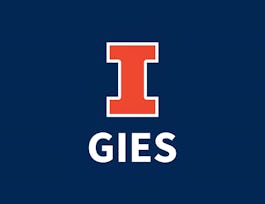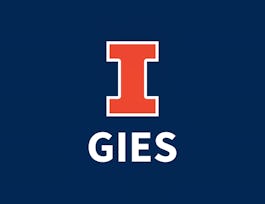Master the technical skills needed to analyze financial statements and disclosures for use in financial analysis, and learn how accounting standards and managerial incentives affect the financial reporting process. By the end of this course, you’ll be able to read the three most common financial statements: the income statement, balance sheet, and statement of cash flows. Then you can apply these skills to a real-world business challenge as part of the Wharton Business Foundations Specialization.

New year. Big goals. Bigger savings. Unlock a year of unlimited access to learning with Coursera Plus for $199. Save now.


Introduction to Financial Accounting
This course is part of multiple programs.

Instructor: Brian J Bushee
343,961 already enrolled
Included with 
(8,247 reviews)
Skills you'll gain
Details to know

Add to your LinkedIn profile
6 assignments
See how employees at top companies are mastering in-demand skills

Build your subject-matter expertise
- Learn new concepts from industry experts
- Gain a foundational understanding of a subject or tool
- Develop job-relevant skills with hands-on projects
- Earn a shareable career certificate


Earn a career certificate
Add this credential to your LinkedIn profile, resume, or CV
Share it on social media and in your performance review

There are 4 modules in this course
To learn a foreign language like Accounting, you need quite a bit of practice in the basic foundations (grammar, syntax, idioms, etc.). This material is absolutely essential for being able to read and to understand books written in the language (in our case, financial statements.). This week, we will start building these foundations. We will start with an overview of financial reporting. What types of reports are required? Who makes the rules? Who enforces the rules? Then, we will cover the balance sheet equation and define/discuss Assets, Liabilities, and Stockholders' Equity. We will introduce debit-credit bookkeeping and do lots of practice in translating transactions into debits and credits. Finally, we will introduce a case of a start-up company to provide you insights into all of the steps necessary to go from recording the first transactions of a new business all the way through its first set of financial statements.
What's included
9 videos7 readings2 assignments
We will start with a discussion of Accrual Accounting and how it affects the recognition of the Income Statement accounts: Revenues and Expenses. Then, we will cover adjusting entries, which are needed to prepare our internal books for the upcoming financial statements. Finally, we will discuss closing entries and the preparation of the Balance Sheet and Income Statement. At each stage, we will continue to work on the case of our start-up company. If you are not sick and tired of journal entries by the end of this week, then I have not done my job!
What's included
8 videos6 readings1 assignment
Cash is King! We will start with the classification of cash flows into operating, investing, and financing activities. Then, we will work on preparing and analyzing the Statement of Cash Flows. We will wrap up the case on the start-up company by preparing and analyzing its Statement of Cash Flows. Finally, we will discuss the differences between Earnings, Cash from Operations, EBITDA, and Free Cash Flow.
What's included
7 videos4 readings1 assignment
We will have our final exam this week. Because of the exam, I will cover Ratio Analysis, which will not involve any "new" material. While we will define and discuss a number of ratios, they will all basically involve dividing one accounting number by another. But, the analysis of what those ratios mean will involve a deep understanding of Balance Sheet and Income Statement accounts. Thus, the Ratio Analysis videos will help provide a nice review of the material, which will help you prepare for the exam. However, there will be no questions about ratio analysis on the exam. The only thing left to do after this exam is to impress your family, friends, and co-workers with your vast knowledge of Financial Accounting!
What's included
5 videos3 readings2 assignments
Instructor

Offered by
Recommended if you're interested in Business Essentials

University of Illinois Urbana-Champaign

University of California, Irvine

University of Illinois Urbana-Champaign

University of California, Irvine
Why people choose Coursera for their career




Learner reviews
8,247 reviews
- 5 stars
81%
- 4 stars
14.40%
- 3 stars
2.94%
- 2 stars
0.84%
- 1 star
0.78%
Showing 3 of 8247
Reviewed on May 5, 2020
The course was very educational and taught me the fundamentals so I can think about a career in accounting. The learning style isn't boring and provides good information about real world problems.
Reviewed on Jan 13, 2019
Learned a lot from Prof. Brian Bushee class. Is my second class on Financial Accounting from a different school. With his explanation and examples the numbers make sense now. Thanks for the class
Reviewed on Jul 12, 2022
So many useful things to learn. The course is well organized. The instructor is so funny, using many interesting ways to get learners involved and make it not boring at all. I love him so much!!!
New to Business Essentials? Start here.

Open new doors with Coursera Plus
Unlimited access to 10,000+ world-class courses, hands-on projects, and job-ready certificate programs - all included in your subscription
Advance your career with an online degree
Earn a degree from world-class universities - 100% online
Join over 3,400 global companies that choose Coursera for Business
Upskill your employees to excel in the digital economy
Frequently asked questions
Access to lectures and assignments depends on your type of enrollment. If you take a course in audit mode, you will be able to see most course materials for free. To access graded assignments and to earn a Certificate, you will need to purchase the Certificate experience, during or after your audit. If you don't see the audit option:
The course may not offer an audit option. You can try a Free Trial instead, or apply for Financial Aid.
The course may offer 'Full Course, No Certificate' instead. This option lets you see all course materials, submit required assessments, and get a final grade. This also means that you will not be able to purchase a Certificate experience.
When you enroll in the course, you get access to all of the courses in the Specialization, and you earn a certificate when you complete the work. Your electronic Certificate will be added to your Accomplishments page - from there, you can print your Certificate or add it to your LinkedIn profile. If you only want to read and view the course content, you can audit the course for free.
If you subscribed, you get a 7-day free trial during which you can cancel at no penalty. After that, we don’t give refunds, but you can cancel your subscription at any time. See our full refund policy.

